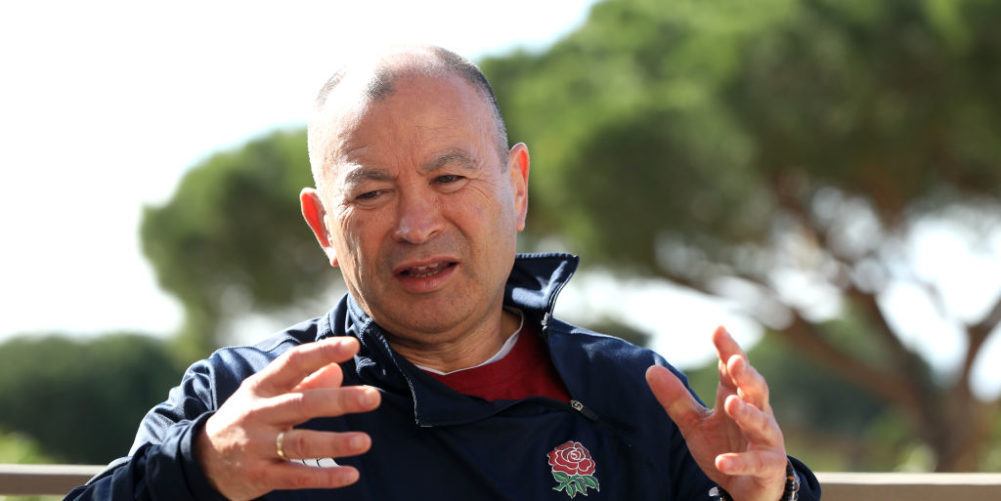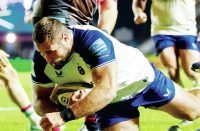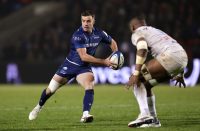THIS time four years ago Eddie Jones was the Six Nations new boy, whereas one World Cup cycle later the England coach is now the ‘Daddy’ of the tournament.
The rest of the coaches in the 2020 Six Nations are infants by comparison. Andy Farrell (Ireland), Wayne Pivac (Wales), Fabien Galthie (France), and Franco Smith (Italy), are all in their first season in charge, while Gregor Townsend (Scotland) is about to go into his third tournament.
It goes to show, in a week in which the fall-out from the Saracens relegation bombshell overshadowed the preamble to the tournament, just how quickly the landscape changes in the professional game.
Jones is not just the oldest age-wise, but is one of the big beasts of international coaching.
He not only goes into his fifth Six Nations campaign as, statistically, in terms of win loss-ratio, the all-time most successful England coach, he is also one of the most experienced, having coached Australia and Japan at Test level, as well as being a consultant to South Africa, before arriving at Twickenham.
Fast Eddie emerged from the 2019 World Cup with a record of 36 wins from his 46 Tests, which gives him a win-loss ratio of 78.3 per cent.
The only other England coaches/managers in close proximity are: Dick Best on 76.4 per cent, but over a much shorter span of 17 Tests (1992-94), Jack Rowell 29 Tests (1994-97) on 72.4 per cent, Geoff Cooke 49 Tests (1988-94) on 71.4 percent, and Sir Clive Woodward, with a much higher tally of 83 Tests (1997-2004), on 71.1 percent.
However, in terms of winning Six Nations silverware, Jones, like his old sparring partner Woodward, has found Six Nations success a great deal more elusive than he anticipated.
Having got off to a great start with a Grand Slam at the first attempt in 2016, and won a second Championship title in 2017 despite defeat in Dublin, he has found it harder going. The fifth-place blow-out in 2018 was testament to that, and although there was a big improvement in 2019, ultimately, an away defeat by Wales, and a draw at home against Scotland did not give the lift-off Jones wanted going into the World Cup.
However, England have shown in the year since the last Six Nations, that, despite hitting the skids against South Africa in the final in Yokohama, they are a hard team to beat.
When Jones announced his 34-man squad for the first tournament of the new decade at Twickenham earlier this week, he acknowledged that the opening game against a new-look France side in Paris was what it should be. Testing.
There is also something of the sporting impresario about Jones, who arrived at his first Press conference of the season with a new motivational message for his team, and for England fans, after the disappointment of missing out on a second world title in Japan little more than two months ago.
He knew that a new mantra along the old lines of “my only focus is winning the World Cup final in Paris on Saturday October 21st, 2023”, would be a case of four-more-years too far – and therefore came up with one which was more appropriate for a coach on a two-year contract extension.
Fast Eddie’s new Holy Grail? To produce “the greatest team that the game of rugby has ever seen”. The accentuation of the positives kept on coming. “I love coaching good players. I have an opportunity to coach a great team that is only going to get better. I’m just excited by it.”
Jones said he had added eight “absolutely outstanding” young players, “who have the potential to be great players”, to 21 survivors from the 2019 World Cup squad. These included Bath front rowers, tight-head Will Stuart and hooker Tom Dunn, Saracens flanker Ben Earl, Gloucester wing Ollie Thorley, Wasps fly-half Jacob Umaga, and the Northampton trio of lock Alex Moon, full-back George Furbank and centre Fraser Dingwall.
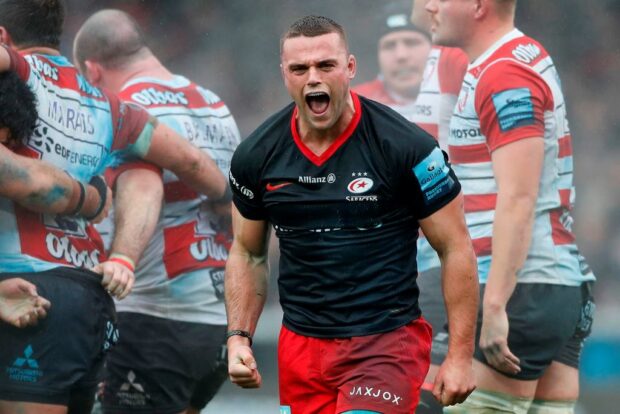
As for the seasoned Saracens players who have been at the core of his post-2015 England revival, headed by England captain Owen Farrell and lock Maro Itoje, there was no molly-coddling on offer. “They have a decision to make to be in their best condition to play France. That’s the only decision they need to make.”
Asked about the timescale of his ambition to make England the greatest, Jones said that his mindset is that it starts now. “I want to do it next weekend. Why can’t we go out and play fantastic football against France?”
The England head coach said that his side had “touched on it” when beating New Zealand in the World Cup semi-final, but added there was still too much inconsistency for them to be comparable with the greatest New Zealand and Australian teams.
“We played a great game against the All Blacks, but we’ve only done that once. When you’ve been in that area, you want to do it sustainably.”
However, when it was suggested that Grand Slams were the main currency of greatness in the Six Nations, Jones was careful not to be backed into a corner where results rule.
This is especially because England have only two games on their own turf, whereas France, Wales and Ireland have three of them in a tournament in which home advantage is frequently a telling factor.
He said: “I don’t think it’s marked by Grand Slams. You can win Grand Slams without playing great rugby, as you can win a World Cup without playing great rugby. I am talking about playing sustainable rugby that people remember.”
Soon afterwards, Jones voiced his concern that part of the problem with trying to playing great rugby is that it relies on getting enough quick ball. He argued that at the World Cup deliberate breakdown and offside infringements that were not picked up by referees slowed it down, and that there was a danger the same could happen in this Six Nations.
He highlighted tacklers and the assist tackler not releasing before contesting for the ball, and sharper refereeing of the offside-line, adding, “all those things that used to get penalised, which don’t anymore”.
While it is easy to understand Jones’ preoccupation with quick ball, one thing that is not always easily comprehensible is his selection policy.
Scrum-half is a case in point. Why, if there are these issues with fast ball, and you want to play a high-tempo game, would you pick a scrum-half like Ben Youngs, who, despite being hugely experienced, does not have a nano-second pass? Furthermore, why would you back him up with a veteran like Willi Heinz, whose service is also not quicksilver.
Jones did not tolerate a slow scrum-half service when he was coach of Japan, so why does he do so as coach of England – particularly when he wants to push the boundaries and play great rugby?
It begs the question, if you are not prepared to give a scrum-half like Ben Spencer a proper chance at the start of a new cycle, when you have put him on your World Cup final bench, or give a sharp distributor like Dan Robson a proper run, when do you make that decision?
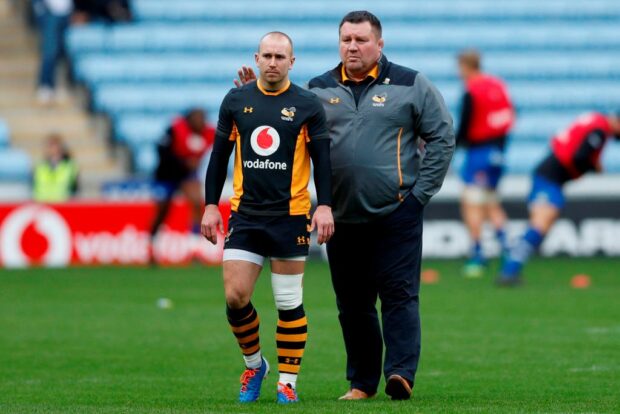
The same questions apply at No.8, the other pivotal link between forwards and backs. Billy Vunipola, the 6ft 2ins No.8 powerhouse England have just lost with another forearm break, is 20st, yet the England head coach has picked five flankers as back row forwards -– three of whom are occasional No.8’s – who are between three and four stone lighter.
Earl, Sam Underhill, Tom Curry, and Lewis Ludlum are between 6ft and 6ft 2ins, and around 16st 7lbs, which is not big in current international back row terms. That leaves Worcester‘s Ted Hill, a 20-year-old blindside rookie who has had five minutes of Test rugby, and, although he is 6ft 5ins and 17st, has rarely played at 8.
While Curry, Earl and Ludlum have some experience at 8, none of them are regulars in the position for their clubs, whereas the heavy-duty specialists Jones has overlooked include the promising Harlequins No.8 Alex Dombrandt, at 6ft 4ins and 18st 8lbs, and Bristol’s similarly built but out-of-favour Nathan Hughes.
My belief is that the time-honoured backrow thinking of two big, quick men – typically a tall, abrasive blindside, and a powerful No.8 with good hands – working alongside a scavenging, linking, fast junk-yard dog openside, is a template that still takes some beating.
However, Jones says his thinking has moved on. He says it is still a question of balance, but that there are other ways of achieving it.
“I’ve made a decision on what I feel is the right balance for the back row. There are some good young players out there. I’ve been watching them very carefully to see if they are the right sort of No.8 for us. We’ve decided to go for a different way of playing at No.8 without Billy – and that’s a judgement call.”
He added: “You are always looking at a balance between your 4/5/6/7/8, a balance between ball-running capabilities, defensive capabilities, work-rate capabilities. We’ve got a view of how we can be most effective in that area without a Billy-type player.”
Jones prides himself on being an innovative thinker and five star selector. However, he also admits he makes mistakes.
He said he made errors in 2018, by not rebuilding his squad sooner, and again in his World Cup starting line-up against South Africa, principally by not drafting in Joe Marler for Mako Vunipola and Henry Slade for George Ford.
France coach Galthie could be forgiven for thinking that Jones might have made a further two errors by picking veteran scrum-halves and young, largely untried Test No.8s who lack aerial presence.
Galthie has two livewire scrum-halves in Antoine Dupont and Baptiste Serin, and a pine forest of a backrow in which new captain Charles Ollivon (6ft 6ins), plays flanker but can play No.8, as can Gregory Aldritt (6ft 3ins), who was at 8 for France in the World Cup. The same is true of Sekou Macalou and Dylan Cretin (both 6ft 5ins) and Francois Cros (6ft 3ins).
Jones has never lacked conviction or tactical cunning, but by gambling at 8 and 9 he risks his main supply-line being cut. If, at the line-outs, scrums, restarts, and in the high-ball aerial contest, France pile on the pressure and England have no answer – and no fast ball – unfortunately, Jones’ aspiration to play fantastic rugby from the off could fizzle out.
NICK CAIN

